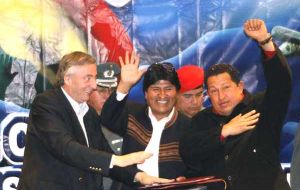MercoPress. South Atlantic News Agency
Venezuela, Bolivia and Argentina promote energy production
 United we stand for abundat energy
United we stand for abundat energy The presidents of Venezuela, Bolivia, and Argentina signed on Friday agreements to share costs of energy production and convened funding for the construction of a gas separation plant near Bolivia's border with Argentina.
Venezuela's Hugo Chavez, Bolivia's Evo Morales, and Argentina's Nestor Kirchner met at the southern province of Tarija where most of Bolivia's vast natural gas proven reserves, second only to Venezuela are located. President Chavez has been campaigning for more integration of the energy industry in South America and Bolivia was his last stop on a four-nation tour meant to promote South American energy production. In a two day packed agenda, Chavez's first activity in Bolivia was the creation, together with president Morales of Petroandina, a joint society between government owned Petroleos de Venezuela PDVSA and Bolivian Oil Fields (YPFB). Speaking in La Paz at government palace, Palacio Quemado, Chavez said his tour of Argentina Uruguay, Ecuador and now Bolivia was a confirmation that the time of "true independence has just come", and admitted to be very happy and committed with such a challenge. The creation of Petroandina, he said, is "barely the first step of thousands that we'll be taking in joint projects and other enterprises". Chavez emphasized that only with sovereignty the natural resources that in the past were plundered by the United States and multinational corporations, are now for the benefit of the Venezuelan and Bolivian peoples, "thanks to the nationalization process". With an initial investment of 600 million dollars for exploration, Petroandina will also be involved in the exploitation and commercialization of crude. Kirchner warns oil companies about investments Argentina is willing to invest heavily in the exploration and production of natural gas in Bolivia if the multinational companies, such as (Brazil's) Petrobras and (Spain's) Repsol-YPF, are not committed to the undertaking warned Argentine president Nestor Kirchner in Tarija. Kirchner, host Bolivian president Evo Morales and visiting leader Hugo Chavez from Venezuela held a summit in Bolivia to address regional energy issues, including a network of pipelines, refineries and conversion plants that will "liberate" the continent and "ensure energy supply for the next hundred years". "If those corporations so not invest in these natural gas fields, I'll say it once again (said Kirchner looking towards Evo Morales), Argentina is willing to come and invest to generate all the energy that is needed". With investments in the industry virtually frozen since the oil and gas nationalizing process begun in May 2006, Bolivia is facing growing problems to comply with natural gas supply agreements signed with Brazil and Argentina. "It's not a threat, we're not bullying people, it's merely appealing to the responsibility of private oil and gas corporations in the region", added Kirchner who signed an agreement with Morales for the industrialization of natural gas. "And if you don't do it there's no need to quarrel, decisions must be taken, one must have courage, solidarity and association capacity", he added. "My dear Evo (Morales) my phone line will be waiting for your call if these businessmen who should be helping but won't do so, be it from Petrobras, Repsol-YPF, or whoever, I'll pick up the phone and Argentina will come and invest to help you generate all the gas production we need", Kirchner insisted before a cheering crowd. Morales and Kirchner agreed a 450 million US dollars credit for the construction of a natural gas liquid splitting plant which is the first step of the Bolivian project to industrialize its massive gas reserves estimated in 1.33 trillion cubic meters. The plant is expected to process between 30 and 38 million cubic meters per day of gas and should be operational by 2008, and will be linked to another bi-national mega project the Northeast Argentine Gas Pipeline, GNEA. Bolivia and Argentina have subscribed a strategic energy association agreement for the provision of natural gas over 20 years involving at least 17 billion US dollars.




Top Comments
Disclaimer & comment rulesCommenting for this story is now closed.
If you have a Facebook account, become a fan and comment on our Facebook Page!